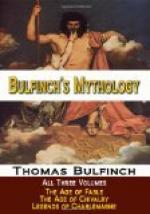A ROLAND FOR AN OLIVER
Guerin de Montglave held the lordship of Vienne, subject to Charlemagne. He had quarrelled with his sovereign, and Charles laid siege to his city, having ravaged the neighboring country. Guerin was an aged warrior, but relied for his defence upon his four sons and two grandsons, who were among the bravest knights of the age. After the siege had continued two months Charlemagne received tidings that Marsilius, king of Spain, had invaded France, and, finding himself unopposed, was advancing rapidly in the Southern provinces. At this intelligence Charles listened to the counsel of his peers, and consented to put the quarrel with Guerin to the decision of Heaven, by single combat between two knights, one of each party, selected by lot. The proposal was acceptable to Guerin and his sons. The names of the four, together with Guerin’s own, who would not be excused, and of the two grandsons, who claimed their lot, being put into a helmet, Oliver’s was drawn forth, and to him, the youngest of the grandsons, was assigned the honor and the peril of the combat. He accepted the award with delight, exulting in being thought worthy to maintain the cause of his family. On Charlemagne’s side Roland was the designated champion, and neither he nor Oliver knew who his antagonist was to be.
They met on an island in the Rhone, and the warriors of both camps were ranged on either shore, spectators of the battle. At the first encounter both lances were shivered, but both riders kept their seats, immovable. They dismounted, and drew their swords. Then ensued a combat which seemed so equal, that the spectators could not form an opinion as to the probable issue. Two hours and more the knights continued to strike and parry, to thrust and ward, neither showing any sign of weariness, nor ever being taken at unawares. At length Orlando struck furiously upon Oliver’s shield, burying Durindana in its edge so deeply that he could not draw it back, and Oliver, almost at the same moment, thrust so vigorously upon Orlando’s breastplate that his sword snapped off at the handle. Thus were the two warriors left weaponless. Scarcely pausing a moment, they rushed upon one another, each striving to throw his adversary to the ground, and failing in that, each snatched at the other’s helmet to tear it away. Both succeeded, and at the same moment they stood bare-headed face to face, and Roland recognized Oliver, and Oliver Roland. For a moment they stood still; and the next, with open arms, rushed into one another’s embrace. “I am conquered,” said Orlando. “I yield me.” said Oliver.
The people on the shore knew not what to make of all this. Presently they saw the two late antagonists standing hand in hand, and it was evident the battle was at an end. The knights crowded round them, and with one voice hailed them as equals in glory. If there were any who felt disposed to murmur that the battle was left undecided they were silenced by the voice of Ogier the Dane, who proclaimed aloud that all had been done that honor required, and declared that he would maintain that award against all gainsayers.




